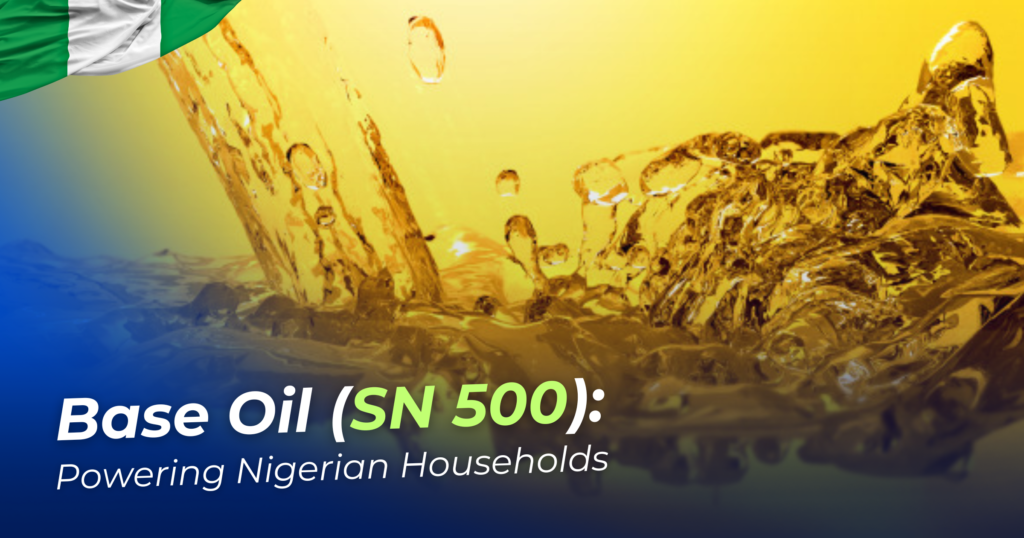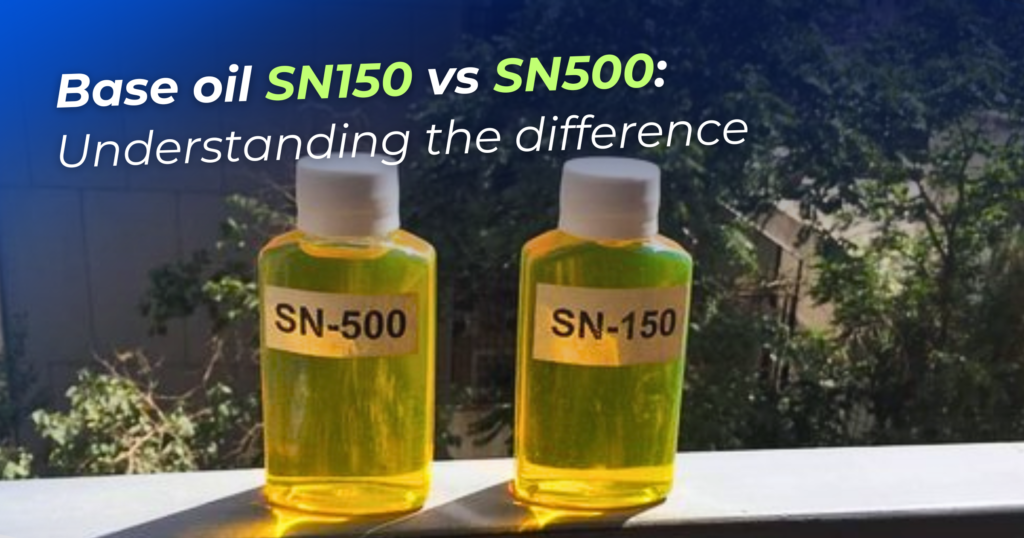
The energy sector in Nigeria is a critical component of the nation’s economy, and the role of Base Oil SN 500 in powering Nigerian households cannot be overstated. This article aims to shed light on the significance of this versatile oil, its various applications, and its impact on the energy sector. Whether an industry professional or a curious homeowner, understanding the importance of a reliable and efficient base oil like SN500 can offer valuable insights.
Firstly, in Nigeria, energy remains a fundamental need for every household. From powering essential appliances to ensuring the smooth running of home-based businesses, the demand for reliable and efficient energy sources is ever-increasing.
Basically, this in-depth article aims to compare Virgin and Recycled Base Oil SN500, shed light on its significance in Nigeria’s energy landscape and households, and explore its myriad applications. We’ll also examine its benefits, and availability in Nigeria.
Whether you are an energy enthusiast keen to understand the intricacies of base oils, a homeowner looking for reliable energy solutions, or an industry professional, this article offers valuable insights into the world of Base Oil SN500.
What is Base Oil SN500?
Base Oil SN500 is a Grade I light-grade oil, meaning it’s one of the least refined base oil types. It falls under the Group I category, characterized by a high saturate level, less than 30% aromatics, and more than 0.03% sulfur. These characteristics make it a reliable choice for various industrial and household applications.
The production of Base Oil SN500 involves a series of refining processes, including solvent refining and dewaxing, making it adaptable to climatic conditions. Also known for its high viscosity index, it has a low pour point, meaning it remains fluid at lower temperatures, making it safer for various applications.
Virgin vs. Recycled Base Oil SN500
While Virgin Base Oil SN500 is derived from crude oil, Recycled Base Oil SN500 is obtained from used oils that have been processed and refined. Both types have advantages and disadvantages but generally serve the same purpose in various applications.
The Journey from Crude to Virgin Base Oil
Virgin Base Oil SN500 starts its life as crude oil extracted from the earth’s crust. It undergoes complex refining processes, including distillation, solvent extraction, and dewaxing, to become the pure, stable oil it is. This ensures that it meets the highest quality and purity standards. Hence, it’s the preferred choice for critical applications where even the slightest impurity could be detrimental.
Recycled Base Oil SN500, on the other hand, is born from used oils, such as spent motor oils or industrial lubricants. They undergo a different refining process, including filtration and hydrogenation, to remove impurities and contaminants. Although not as pure as its virgin counterpart, it’s still highly functional and effective for various applications.
Quality vs Sustainability: The Trade-Off
Virgin Base Oil SN500 often has the upper hand regarding quality and performance, with its higher purity and stability. However, Recycled Base Oil SN500 offers a more sustainable alternative, as it reduces waste, and more environmentally friendly.
Virgin Base Oil SN500 is often used in high-performance engines, medical equipment, and other critical applications where the margin for error is minimal. Meanwhile, recycled base oil SN500 finds its place in less critical applications like general-purpose lubricants and industrial oils.
Due to its complex refining processes, Virgin Base Oil SN500 is generally more expensive, with Recycled Base Oil SN500 more cost-effective, and viable where the highest purity levels are not a necessity.
Uses and Applications of Base Oil (SN 500) in Nigerian Households
Imagine a day in a typical Nigerian household. The generator hums in the background, providing the much-needed electricity to power the home. The family car sits in the driveway, ready for the daily commute. Various appliances, from the washing machine to the kitchen blender, await their turn to make life easier. What’s the common thread here? Base Oil SN500 is the unsung hero that keeps the wheels of daily life turning smoothly.
Powering Generators
In a country where power outages are not uncommon, generators are often considered the heartbeat of a home. Base Oil SN500 serves these generators’ lifeblood, ensuring they run efficiently and reliably. The high viscosity index of Base Oil SN500 ensures that the moving parts are adequately lubricated, reducing wear and tear and prolonging the generator’s life.
Powering Household Appliances
From the blender you use to make your morning smoothie to the washing machine that takes care of your laundry, household appliances are the silent workforce of any home. Base Oil SN500 plays a crucial role in lubricating these machines, ensuring they operate efficiently and last longer.
Powering Vehicles
For many families, the car is more than just a means of transportation; it’s a part of the family. Whether for the school run or a weekend getaway, you need a reliable vehicle. The motor oils formulated with Base Oil SN500 ensure your car’s engine runs smoothly, reducing the risk of breakdowns and costly repairs.
Maintenance Routines
Regular maintenance is crucial for the longevity of any machinery. Just as you would go for an annual health check-up, your machinery also benefits from routine inspections. Using a high-quality base oil like SN500 can often make these check-ups a breeze, with fewer issues to address, saving you both time and money.
Benefits of Base Oil (SN 500) for Household Maintenance
Base Oil SN500 offers high efficiency, cost-effectiveness, versatility, and sustainability. Its high viscosity index ensures excellent lubrication, reducing friction and energy consumption by up to 10%.
Virgin SN500 delivers long-lasting performance, while Recycled SN500 provides a budget-friendly alternative with minimal trade-offs. Efficient lubrication reduces machinery wear, cutting repair costs and extending equipment lifespan.
With a high flash point and smooth operation across applications—from motor oils to industrial lubricants—SN500 is a versatile, all-purpose solution. Environmentally, it supports energy savings and waste reduction, while Recycled SN500 offers an eco-friendlier option without sacrificing performance, aligning with sustainable living goals.
Its Impact on the Nigerian Energy Sector
Base Oil SN500 plays a significant role in Nigeria’s energy sector, contributing to sustainable energy solutions, performance enhancement and longevity of machinery and equipment.
Beyond electricity and fuel, the energy sector relies on components like Base Oil SN500, a vital lubricant for the machinery powering Nigeria. From power plants to energy distribution systems, SN500 ensures smooth operations by reducing friction and enhancing efficiency.
As Nigeria embraces renewables like wind and solar, efficient lubrication remains essential. Wind turbines, for example, rely on SN500’s high viscosity index and low pour point to withstand harsh conditions and maintain optimal performance.
The demand for SN500 fuels economic growth, generating jobs in manufacturing, distribution, and maintenance. A thriving local market for base oils has emerged, supporting the sector’s diverse needs and boosting Nigeria’s economy.
Using high-quality, locally available SN500 strengthens energy security by reducing dependence on imports and stabilizing the sector against global disruptions. Strategic reserves of SN500 ensure uninterrupted operations, even during crises, keeping Nigeria’s energy infrastructure resilient and reliable.
Closing Thoughts
In a world increasingly driven by efficiency and sustainability, Base Oil SN500 quietly powers the machinery and systems that make modern living possible. From its pivotal role in the Nigerian energy sector to its ubiquitous presence in households, its impact is as profound as its diversity.
It is not just a lubricant; it’s a lifeline for generators, a guardian for household appliances, and a catalyst for economic growth. Whether you’re an industry professional, an energy enthusiast, or a homeowner, understanding its intricacies can offer valuable insights into how we power our lives and care for our homes.
So the next time you hear your generator humming smoothly, your car purring like a kitten, or even enjoy a simple, worry-free weekend getaway, take a moment to appreciate the silent powerhouse that makes it all possible—Base Oil SN500.
FAQs (Frequently Asked Questions)
What is the difference between Virgin and Recycled Base Oil SN500?
Virgin Base Oil SN500 is derived from crude oil, while Recycled Base Oil is processed from used oils.
Where can I buy Base Oil SN500 in Nigeria?
Several suppliers and distributors offer Base Oil SN500 in Nigeria, making it widely available.
How can Base Oil SN500 enhance the performance of my machinery?
Its superior lubrication qualities ensure smooth operation and longevity of machinery.
Are there any specific guidelines for using Base Oil SN500 in different applications?
While there are no strict guidelines, following manufacturer recommendations for optimal performance is essential.
What is Base Oil (SN 500), and how is it different from other types of base oils?
SN 500 is a heavy-grade base oil used mainly for lubricants. It’s thicker and has a higher viscosity compared to lighter base oils.
What are the environmental impacts of using Base Oil (SN 500)?
It’s not biodegradable, so proper disposal is crucial to minimize environmental impact.
How does Base Oil (SN 500) contribute to energy efficiency in Nigerian homes?
When used in generators, it can improve efficiency by reducing friction, thus saving on fuel costs.
Can Base Oil (SN 500) be mixed with other oils or substances for household use?
It’s not advisable to mix it with other oils unless specified by the manufacturer.
What are the storage guidelines for Base Oil (SN 500) to ensure it maintains its efficacy?
Store it in a sealed container, away from direct sunlight and extreme temperatures.
Are there any government regulations or guidelines concerning using Base Oil (SN 500) in Nigeria?
Yes, it’s regulated by the Department of Petroleum Resources, so always buy from accredited suppliers.


